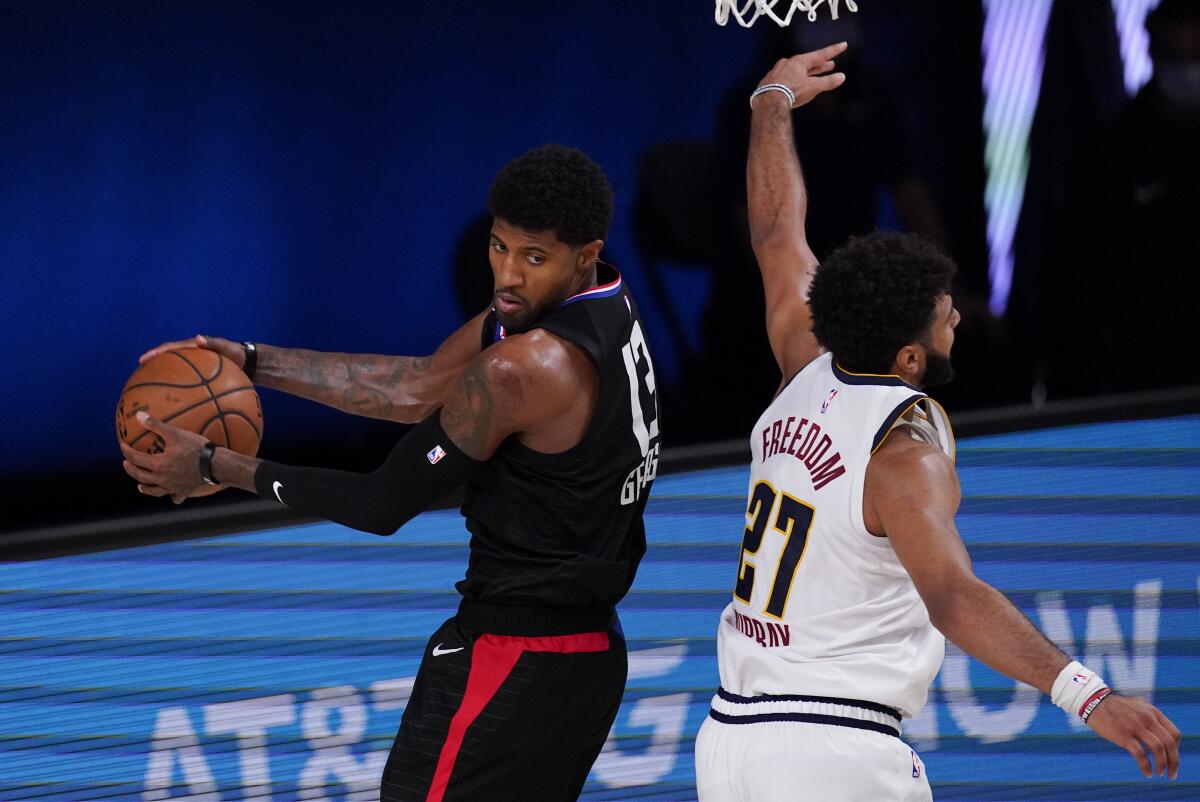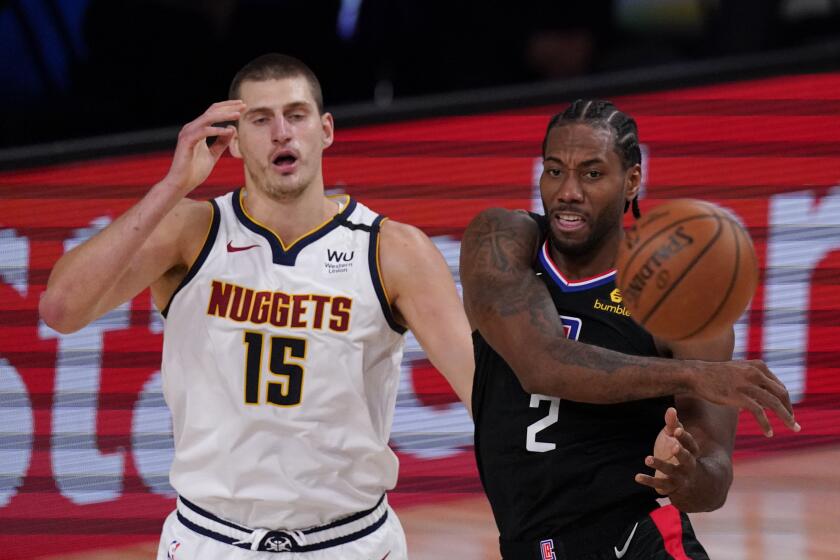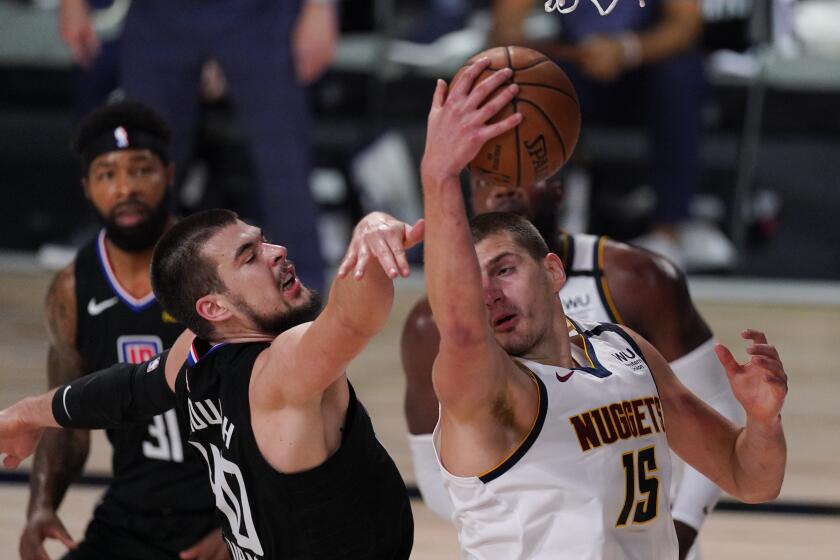Nuggets get tough with Clippers: 5 takeaways from Game 2

- Share via
The Clippers dominated Game 1 of their Western Conference semifinal series against Denver on Thursday, leading to a 23-point win.
Two days later, they found themselves digging out of a 23-point deficit before losing, 110-101, to even the series.
Here are five takeaways from Saturday’s game:
1. After the loss, Clippers coach Doc Rivers characterized the effort as a bad defensive first quarter (they allowed 44 points), followed by three bad offensive quarters. The Clippers made nine of their 32 three-pointers (28.1%), their lowest three-point percentage of this postseason and the first time since Game 2 of the first round that it dipped below 36%.
If that sounds like an outlier performance, it was in fact only the latest struggle felt beyond the arc during these playoffs by Kawhi Leonard and Lou Williams, who combined to miss all 10 threes they took Saturday.
Of the 76 players who have attempted at least four three-pointers per game during this postseason, Leonard’s 28.2% accuracy ranks 67th and Williams’ 25% accuracy ranks 73rd. Paul George made four of his 10 three-pointers in Game 2, but that lifted his ranking only up to 64th.
A counterweight for the Clippers has been Marcus Morris, whose 55.6% shooting from deep ranks second among such high-volume shooters. The Clippers will need more from Leonard (a 37.8% three-point shooter during the regular season), Williams (35%) and George (41.2%) to stop Denver, whose top shooters have been lights-out. Since the postseason began, point guard Jamal Murray has made 48.7% of his threes while center Nikola Jokic is shooting 49.1%.
The Clippers cut a 23-point deficit to five in the fourth quarter but lost 110-101 to Denver in Game 2 of their Western Conference semifinal series.
2. If the Clippers are looking for a silver lining, there is this: History suggests that two of the night’s most stunning, unexpected, outcome-swinging performances are not likely to happen again.
Denver guard Gary Harris was the hero of the fourth quarter by making all three three-pointers he attempted. Consider, then, that in 385 career games, which includes the postseason, Harris has made three fourth-quarter three-pointers exactly one other time — on March 8, 2017.
Leonard’s 0-for-6 shooting after halftime? The last time he failed to score a field goal in the second half of a playoff game was April 30, 2015.
3. Rivers was unhappy with the defensive pressure on Jokic to start the game and the lack of focus led to damaging results. On four first-half possessions, miscommunications by Ivica Zubac and Williams, Williams and Montrezl Harrell, Harrell and Reggie Jackson and, finally, Leonard and Zubac left Jokic wide open. He ended each by making a three-pointer at the top of the arc, often with enough time to take an extra dribble and set himself.
Then Rivers turned to JaMychal Green at center for help and Green delivered.
During the nine possessions in which the 6-foot-9 Green guarded the 7-foot Jokic, the Nuggets center missed both shots he attempted, didn’t record an assist and committed a turnover.
“I thought he was really the only one who showed Jokic any physicality,” Rivers said. “Everybody else showed Jokic whatever he wanted. I thought JaMychal got into him and played him physical.”
Green, who grabbed a postseason career-high 11 rebounds, helped the Clippers outscore Denver by eight points during his 26 minutes on the court. The Clippers were outscored by 17 points in his 22 minutes on the bench.
Zubac, who has consistently been one of the Clippers’ best defenders during the postseason, shouldered much of the blame for how easily Jokic was allowed to operate en route to 24 first-half points.
“I didn’t start out the game right defensively,” he said. “I allowed them to get the ball easy in the post. I was not physical with him like I’m supposed to, and you know, I got to get to his body when they are running pick-and-roll for him and I’ve got to do a better job getting over the pin-downs and cross-screens.
“Overall, I didn’t do a good job defensively tonight, and you know, I’m going to watch the film and see where I can get better and I’m going to bring it next game.”
Ivica Zubac had 15 points and nine rebounds in the Clippers’ Game 2 loss, and he faces a big task against the Nuggets’ Nikola Jokic this series.
4. Several Clippers noted the change in physicality from the first game to the second and lamented their slow response when Denver began Saturday playing markedly more aggressively.
“I thought they deserved to win in so many ways,” Rivers said. “They played with so much more force than us.”
Denver forward Paul Millsap had called for a more physical approach after the Nuggets’ 23-point loss to open this series. It certainly helped that Denver was no longer coming off an exhausting seven-game series against Utah on less than 48 hours of rest, as was the case before Game 1.
“This is playoff basketball, if you don’t have a physical mind set, you’re going home early,” Denver coach Michael Malone said. “I thought we had a physical mind set in that Utah series coming back from a 3-1 deficit. I thought tonight we were a noticeably different team than we were in Game 1— our defense, our activity, and the fact that we were willing to help each other.
“I thought Jerami Grant’s defense on Kawhi was spectacular, but the four guys behind him were giving him the necessary help. I thought Gary Harris’ defense on Paul George was terrific, but the help behind that was what we needed, what we didn’t have in Game 1.”
5. This was the Clippers’ first loss of the postseason when finishing with more rebounds, but those boards were a considerable factor why they weren’t blown out. The Clippers turned their 19 offensive rebounds into 27 second-chance points, and their offensive rebounding rate of 42.9% was their best since Nov. 16.
Four players grabbed at least three offensive rebounds: Leonard, George, Green and Patrick Beverley.
More to Read
Get our high school sports newsletter
Prep Rally is devoted to the SoCal high school sports experience, bringing you scores, stories and a behind-the-scenes look at what makes prep sports so popular.
You may occasionally receive promotional content from the Los Angeles Times.









